|
The pillars of health are physical activity, healthy eating, and quality sleep. These three pillars are essential for maintaining good health and well-being. Each pillar plays a crucial role in our overall health, and neglecting any one of them can have a significant impact on our health.
Physical activity is essential for maintaining a healthy body weight, reducing the risk of chronic diseases, and improving mental health. Regular exercise can help improve cardiovascular health, strengthen bones and muscles, and boost the immune system. Examples of physical activity include walking, running, cycling, swimming, and strength training. Healthy eating is crucial for providing the body with the nutrients it needs to function correctly. A balanced diet that includes a variety of fruits, vegetables, whole grains, lean proteins, and healthy fats can help reduce the risk of chronic diseases such as heart disease, diabetes, and cancer. Eating a healthy diet can also help maintain a healthy weight and improve mental health. Quality sleep is essential for overall health and well-being. Getting enough sleep can help improve mood, cognitive function, and physical performance. Lack of sleep can lead to a range of health problems, including obesity, diabetes, and heart disease. Adults should aim for 7-9 hours of sleep per night. Incorporating daily habits to help each pillar is essential for maintaining good health. For physical activity, try to incorporate at least 30 minutes of moderate-intensity exercise into your daily routine. For healthy eating, aim to eat a balanced diet that includes a variety of fruits, vegetables, whole grains, lean proteins, and healthy fats. For quality sleep, establish a regular sleep routine and avoid electronic devices before bedtime. At Elevation Health Solutions, we specialize in improving health by focusing on these pillars with our coaching and habit-building programs. Our programs are designed to help individuals establish healthy habits that can be sustained over time. We work with individuals to develop personalized plans that incorporate physical activity, healthy eating, and quality sleep. Our coaching and habit-building programs are designed to help individuals achieve their health goals and improve their overall well-being. In conclusion, physical activity, healthy eating, and quality sleep are essential pillars of health. Neglecting any one of these pillars can have a significant impact on our health. Incorporating daily habits to help each pillar is essential for maintaining good health. At Elevation Health Solutions, we specialize in improving health by focusing on these pillars with our coaching and habit-building programs.
0 Comments
Have you ever noticed that you tend to feel more alert and awake during the day, and more tired and sleepy at night? This is because of your body's circadian rhythm, also known as your internal clock. In this blog post, we will explore what circadian rhythm is, how it works, and why it is important for your health and well-being.
Circadian rhythm is a natural, internal process that regulates the sleep-wake cycle of your body. It is a 24-hour cycle that is controlled by a group of cells in the brain called the suprachiasmatic nucleus (SCN). The SCN receives information about light and darkness from the eyes, and uses this information to synchronize your body's internal clock with the external environment. Circadian rhythm works by regulating the production of hormones and neurotransmitters that control your sleep-wake cycle. The most important hormone in this process is melatonin, which is produced by the pineal gland in the brain. Melatonin is released in response to darkness, and helps to promote sleepiness and prepare your body for sleep. In addition to melatonin, other hormones and neurotransmitters that are involved in circadian rhythm include cortisol, adrenaline, and serotonin. Cortisol is a hormone that is released in response to stress, and helps to keep you alert and awake during the day. Adrenaline is a neurotransmitter that is released in response to excitement or stress, and helps to increase your heart rate and blood pressure. Serotonin is a neurotransmitter that is involved in mood regulation, and helps to promote feelings of happiness and well-being. Circadian rhythm is important for your health and well-being because it helps to regulate your sleep-wake cycle, which is essential for maintaining good health. When your circadian rhythm is disrupted, it can lead to a variety of health problems, including insomnia, depression, anxiety, and obesity. In addition to these health problems, circadian rhythm disruption has also been linked to an increased risk of chronic diseases, such as diabetes, heart disease, and cancer. This is because circadian rhythm disruption can lead to changes in the production of hormones and neurotransmitters that are involved in these diseases. There are several things that you can do to optimize your circadian rhythm and promote better sleep. These include establishing a regular sleep schedule, avoiding caffeine and alcohol, exercising regularly, avoiding bright lights at night, creating a relaxing bedtime routine, and getting morning sunlight. Exposure to natural light in the morning helps to reset your body's internal clock and promote wakefulness during the day. This is because sunlight contains blue light, which is the most effective type of light for regulating your circadian rhythm. So, try to spend some time outside in the morning, or open your curtains to let in natural light. By taking these steps, you can help to promote better sleep and improve your overall health. In conclusion, circadian rhythm is a natural, internal process that regulates your sleep-wake cycle. It is important for your health and well-being, and can be improved by establishing a regular sleep schedule, avoiding caffeine and alcohol, exercising regularly, avoiding bright lights at night, creating a relaxing bedtime routine, and getting morning sunlight. By taking these steps, you can help to promote better sleep and improve your overall health. Sleep apnea is a sleep disorder that occurs when your breathing repeatedly stops and starts during sleep. This can happen hundreds of times a night, and it can disrupt your sleep. Sleep apnea can cause a number of health problems, including:
There are a number of things you can do to lose weight if you have sleep apnea. These include:
Here are some additional tips for losing weight if you have sleep apnea:
We specialize in offering Lifestyle Intervention programs that help with both Sleep Apnea and weight loss. Begin the conversation by completing our online health assessment. Heart rate variability (HRV) is an important metric for understanding your body's response to stress and recovery. HRV refers to the variation in time between each heartbeat, and is influenced by a variety of factors including physical activity, sleep, and stress. By tracking your HRV, you can gain insights into your body's autonomic nervous system and overall health and well-being. For example, a high HRV is generally associated with better cardiovascular system and health, while a low HRV can be a sign of stress or overtraining. There's not a normal HRV for men, women or even by age group. HRV is a unique individual metric that varies from one person to the next. You should only compare your HRV to your own value over time to gain a sense of what's a normal value for you. To improve your HRV, there are a few key strategies you can implement. These include getting enough sleep, managing stress, and engaging in regular physical activity. It's also important to fuel your body with healthy foods and stay hydrated. In addition to these lifestyle factors, there are also specific techniques you can use to improve your HRV. These include breathing exercises and meditation. These practices have been shown to reduce stress and improve overall health, which can lead to improved HRV. Stress is a common problem that affects many people, and it can have a significant impact on our health and well-being. However, by using heart rate variability (HRV) biofeedback, we can learn to manage stress and improve our overall health. When we are stressed, our HRV decreases, and our body's ability to adapt to stress is reduced. By using HRV biofeedback, we can learn to increase our HRV and improve our body's ability to adapt to stress. HRV biofeedback involves using a device to measure your HRV and provide feedback on your breathing and heart rate. By practicing slow, deep breathing, you can increase your HRV and reduce stress. HRV biofeedback has been found to be effective in reducing stress and anxiety, improving sleep quality, and enhancing overall well-being. One way to track your HRV biofeedback is through wearable technology such as the WHOOP Strap, Oura ring or Oxa Life device. You will also need to find a quiet, comfortable place to practice, free from distractions. Once you have your device and a quiet space, you can begin practicing HRV biofeedback. To start, sit comfortably and with your device in place. Take a few slow deep breaths through your nose and focus on your breathing. Slowly inhale and exhale through your nose. As you exhale, imagine that you are releasing stress and tension from your body. Continue breathing slowly and deeply for several minutes, focusing on your breath and your heart rate. The Oxa offers great visualization of your breath, Heart rate and HRV in real time. The Oxa life sensor connects to a smart textile shirt, bra or chest band.
As you practice HRV biofeedback, you may notice that your HRV increases, and you feel more relaxed and calm. With regular practice, you can improve your body's ability to adapt to stress and reduce the negative effects of stress on your health and well-being. In conclusion, stress is a common problem that affects many people, but by using HRV biofeedback, we can learn to manage stress and improve our overall health. HRV biofeedback involves using a device to measure your HRV and provide feedback on your breathing and heart rate. By practicing slow, deep breathing, you can increase your HRV and reduce stress. With regular practice, you can improve your body's ability to adapt to stress and enjoy the many benefits of improved health and well-being. So, whether you're an athlete looking to improve your performance or simply looking to improve your overall health, consider incorporating HRV tracking and improvement strategies into your routine. Breathing is an essential function of the human body, and it is something that we do without even thinking about it. However, the way we breathe can have a significant impact on our health and well-being. Nasal breathing is the natural way of breathing, and it has several physiological functions that are crucial for our health.
The nose is not just a protruding feature on our face; it has a vital role in the respiratory system. The nose is responsible for warming, filtering, and humidifying the air we breathe. When we inhale through our nose, the air is warmed to body temperature, which is essential for the proper functioning of our lungs. The nose also filters out dust, pollen, and other particles that can irritate our lungs. Additionally, the nose humidifies the air, which helps to prevent dryness in the respiratory system. Another crucial function of the nose is the production of nitric oxide. Nitric oxide is a gas that is produced in the nasal cavity, and it has several health benefits. Nitric oxide helps to dilate blood vessels, which improves blood flow and oxygen delivery to the body's tissues. It also has anti-inflammatory properties, which can help to reduce inflammation in the respiratory system. Nasal breathing is advantageous over oral breathing for several reasons. When we breathe through our mouth, we bypass the nose's filtering and humidifying functions, which can lead to dryness and irritation in the respiratory system. Mouth breathing can also lead to snoring and sleep apnea, which can have a significant impact on our sleep quality and overall health. Mouth taping is a therapy that can help to overcome mouth breathing during the night. Mouth taping involves placing a piece of tape over the mouth before going to bed. This therapy can help to train the body to breathe through the nose, which can improve sleep quality and reduce the risk of snoring and sleep apnea. We believe the safest and most effective type of tape is Myotape. In conclusion, nasal breathing is the natural way of breathing, and it has several physiological functions that are crucial for our health. Nasal breathing is advantageous over oral breathing for health and especially sleep. Mouth taping is a therapy that can help to overcome mouth breathing during the night and improve sleep quality. So, let's make a conscious effort to breathe through our nose and reap the benefits of nasal breathing. Sleep is an essential part of our daily lives, and getting enough quality sleep is crucial for our overall health and well-being. With the rise of technology, there are now a variety of sleep trackers available on the market that can help us monitor our sleep patterns and improve our sleep quality. In this blog post, we'll take a look at some of the most popular sleep trackers, including Oura, Whoop, Apple Watch, Fitbit, Withings, Sleepon Go2Sleep, and Wellue O2ring, and discuss the benefits of tracking sleep.
Oura The Oura ring is a popular sleep tracker that is worn on the finger. It tracks a variety of metrics, including sleep stages, heart rate variability, and body temperature. The Oura ring also provides personalized insights and recommendations to help users improve their sleep quality. One of the benefits of the Oura ring is its accuracy, as it uses advanced sensors to track sleep metrics. It is our favorite consumer sleep wearable but will come at a higher price point. Save $50 on Oura Whoop Whoop is a wearable sleep tracker that is worn on the wrist. It tracks a variety of metrics, including sleep stages, heart rate variability, and respiratory rate. The Whoop sleep tracker also provides personalized insights and recommendations to help users improve their sleep quality. One of the benefits of the Whoop sleep tracker is its ability to track recovery, which can help users optimize their sleep and training. Trial Whoop Free for one month Apple Watch The Apple Watch is a popular wearable device that offers a variety of features, including sleep tracking, heart rate monitoring, and activity tracking. The Apple Watch sleep tracker uses advanced sensors to track sleep metrics, including sleep stages and heart rate. One of the benefits of the Apple Watch sleep tracker is its integration with other Apple Health features, such as the Health app and the Breathe app. Fitbit Fitbit is another popular wearable device that offers a variety of features, including sleep tracking, heart rate monitoring, and activity tracking. The Fitbit sleep tracker uses advanced sensors to track sleep metrics, including sleep stages, heart rate, and respiratory rate. One of the benefits of the Fitbit sleep tracker is its ease of use, as it requires no additional wearables or devices. Withings Withings is a sleep tracker that is placed under the mattress and uses advanced sensors to track sleep metrics, including sleep stages, snoring, and interruptions. The Withings sleep tracker also provides personalized insights and recommendations to help users improve their sleep quality. One of the benefits of the Withings sleep tracker is its ease of use, as it requires no additional wearables or devices. Sleepon Go2Sleep Sleepon Go2Sleep is a sleep tracker that is worn on the finger and tracks a variety of metrics, including sleep stages, heart rate, and oxygen saturation. The Sleepon Go2Sleep sleep tracker also provides personalized insights and recommendations to help users improve their sleep quality. One of the benefits of the Sleepon Go2Sleep sleep tracker is its price, as it provides adequate sleep data at a value. It is our favorite low cost Sleep wearable. Buy Sleepon Go2Sleep Here Wellue O2ring Wellue O2ring is a sleep tracker that is worn on the finger and tracks a variety of metrics, including sleep stages, heart rate, and blood oxygen levels. The Wellue O2ring sleep tracker also provides personalized insights and recommendations to help users improve their sleep quality. One of the benefits of the Wellue O2ring sleep tracker is its ability to track blood oxygen levels, which can be an indicator of sleep apnea. The O2Ring is the best wearable for monitoring your oxygen saturation. Buy Wellue O2Ring Here Benefits of Tracking Sleep Tracking sleep can have a variety of benefits, including: 1. Improved sleep quality: By tracking sleep metrics, users can identify areas for improvement and make changes to their sleep habits to improve sleep quality. 2. Increased awareness: Sleep trackers can help users become more aware of their sleep patterns and the factors that may be affecting their sleep quality. 3. Personalized insights: Many sleep trackers provide personalized insights and recommendations to help users improve their sleep quality. 4. Better overall health: Getting enough quality sleep is crucial for overall health and well-being, and tracking sleep can help users achieve this goal. Comparing and Contrasting Technologies When it comes to sleep trackers, there are a variety of technologies available, including wearables, under-mattress sensors, forehead sensors, and finger sensors. Each technology has its own benefits and drawbacks, and it's important to choose a sleep tracker that fits your lifestyle and preferences. In conclusion, tracking sleep can have a significant impact on our overall health and well-being. With the variety of sleep trackers available on the market, there is a tracker to fit every lifestyle and preference. Whether you prefer a wearable, under-mattress sensor, forehead sensor, or finger sensor, tracking your sleep can help you achieve better sleep quality and improve your overall health. Snoring is a common problem that affects millions of people worldwide. While it may seem like a harmless annoyance, snoring can actually be a sign of a more serious underlying condition. In this article, we will explore the concern for snoring and why it is important to address this issue.
Snoring occurs when the flow of air through the mouth and nose is partially blocked during sleep. This can be caused by a variety of factors, including obesity, alcohol consumption, smoking, and sleep apnea. When left untreated, snoring can lead to a number of health problems, including high blood pressure, heart disease, and stroke. One of the most common causes of snoring is sleep apnea, a condition in which the airway becomes completely blocked during sleep, causing the person to stop breathing for short periods of time. This can lead to a number of health problems, including fatigue, irritability, and difficulty concentrating during the day. If you or a loved one is experiencing snoring, it is important to seek medical attention. Your doctor can refer you for a sleep study to determine the underlying cause of your snoring and recommend appropriate treatment options. You can also order your own Home Sleep Test to be connected with one of our specialists. One of the most effective treatments for snoring and sleep apnea is continuous positive airway pressure (CPAP) therapy. This involves wearing a mask over the nose and/or mouth during sleep, which delivers a continuous stream of air to keep the airway open. Other treatment options for snoring include lifestyle changes, such as losing weight, quitting smoking, and avoiding alcohol before bedtime. In some cases, surgery may be necessary to correct structural abnormalities in the airway. In addition to the health risks associated with snoring, it can also have a negative impact on relationships. Snoring can disrupt the sleep of both the snorer and their partner, leading to tension and resentment. If you or your partner is experiencing snoring, it is important to address this issue as soon as possible. With the right treatment, you can improve your health and quality of life, and enjoy a peaceful night's sleep. In conclusion, snoring is a concern that should not be ignored. It can be a sign of a more serious underlying condition, and can lead to a number of health problems if left untreated. If you or a loved one is experiencing snoring, seek medical attention to determine the underlying cause and explore treatment options. Sleep hygiene refers to the habits and practices that promote good quality sleep. It is essential for maintaining physical and mental health, as well as overall well-being. Poor sleep hygiene can lead to a range of health problems, including obesity, diabetes, heart disease, and depression. Therefore, it is crucial to optimize your circadian rhythm and improve sleep quality by following some simple tools.
One of the most important tools for optimizing your circadian rhythm is to establish a regular sleep schedule. This means going to bed and waking up at the same time every day, even on weekends. This helps to regulate your body's internal clock and promote better sleep quality. Additionally, it is important to create a relaxing bedtime routine that helps you wind down and prepare for sleep. This may include taking a warm bath, reading a book, or practicing relaxation techniques such as deep breathing or meditation. Another tool for improving sleep quality is to create a sleep-conducive environment. This means making sure your bedroom is cool, dark, and quiet. You may also want to invest in a comfortable mattress and pillows that support your body and help you stay comfortable throughout the night. Additionally, it is important to limit your exposure to electronic devices such as smartphones, tablets, and laptops before bedtime, as the blue light emitted by these devices can disrupt your sleep. In addition to these tools, there are several other strategies you can use to optimize your circadian rhythm and improve sleep quality. For example, you may want to consider incorporating regular exercise into your routine, as this can help regulate your body's internal clock and promote better sleep. You may also want to avoid caffeine and alcohol before bedtime, as these substances can interfere with your sleep. Another important tool for optimizing your circadian rhythm and improving sleep quality is to get morning sunlight. Exposure to natural light in the morning helps to regulate your body's internal clock and promote better sleep at night. This is because sunlight helps to suppress the production of melatonin, a hormone that regulates sleep and wakefulness. Getting morning sunlight is especially important for people who work indoors or spend a lot of time inside. This is because indoor lighting is typically much dimmer than natural sunlight, which can disrupt your body's internal clock and lead to poor sleep quality. Therefore, it is important to make an effort to get outside and expose yourself to natural light in the morning. One way to do this is to take a walk or spend some time outside in the morning. Even just 15-30 minutes of exposure to natural light can have a significant impact on your circadian rhythm and sleep quality. If you are unable to get outside, you may want to consider investing in a light therapy box, which simulates natural sunlight and can help regulate your body's internal clock. In addition to improving sleep quality, getting morning sunlight has a range of other health benefits. It can help boost your mood, increase energy levels, and improve overall well-being. Therefore, it is important to prioritize getting outside and exposing yourself to natural light in the morning as part of your sleep hygiene routine. In conclusion, getting morning sunlight is an important tool for optimizing your circadian rhythm and improving sleep quality. By making an effort to get outside and expose yourself to natural light in the morning, you can regulate your body's internal clock and enjoy better sleep, as well as a range of other health benefits. So, make sure to prioritize getting morning sunlight as part of your sleep hygiene routine. Overall, sleep hygiene is essential for maintaining physical and mental health, as well as overall well-being. By following these simple tools and strategies, you can optimize your circadian rhythm and improve sleep quality, leading to better health and a more fulfilling life. So, make sure to prioritize your sleep hygiene and enjoy the benefits of a good night's sleep. |
AuthorDamian Solorzano is Health and Wellness Influencer, Respiratory Specialist and Health Coach who is passionate about optimizing personal health. Categories
All
Archives
March 2024
|
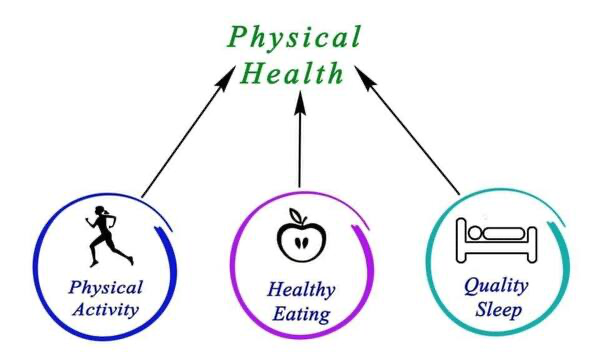
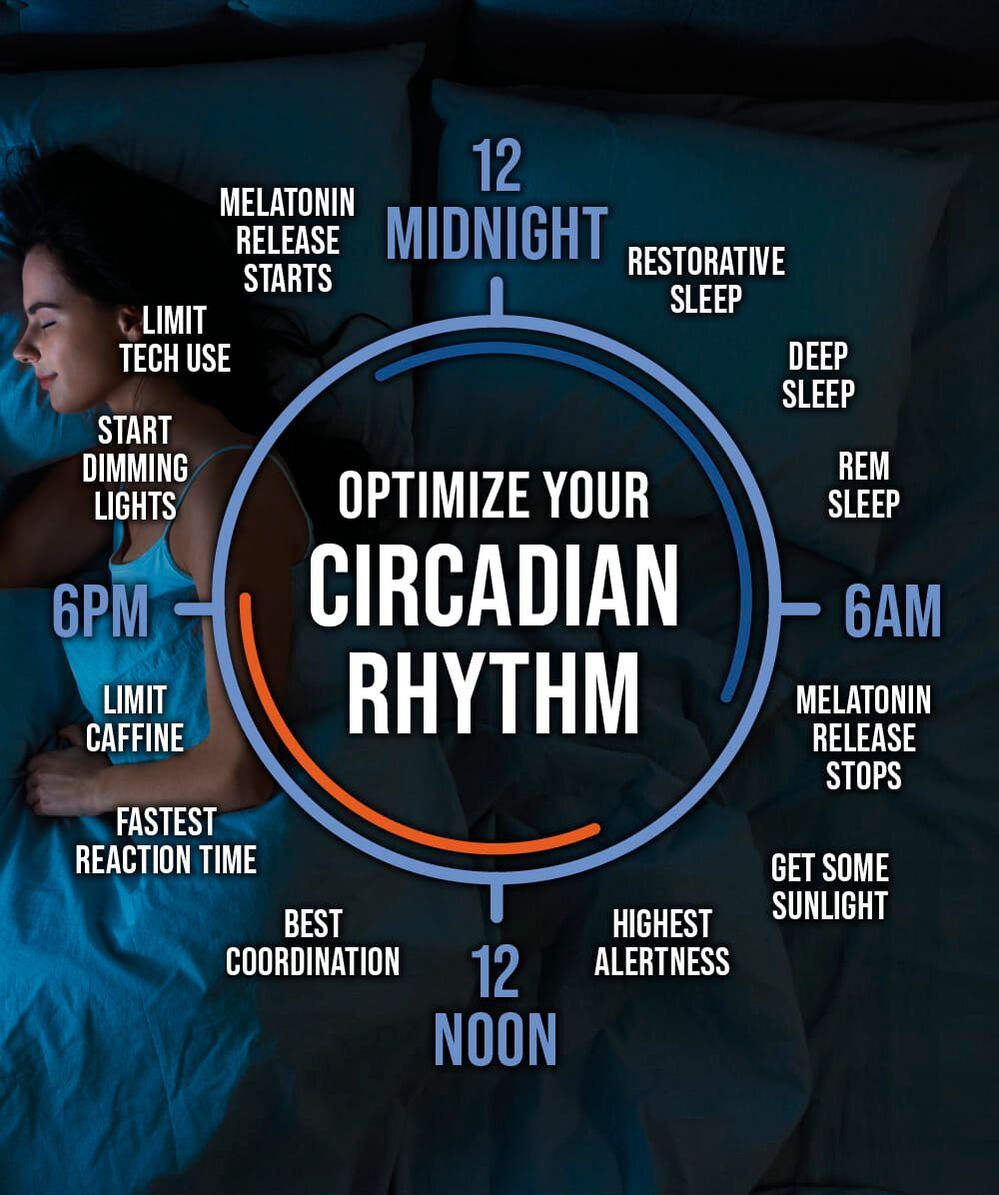


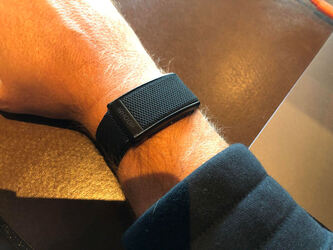

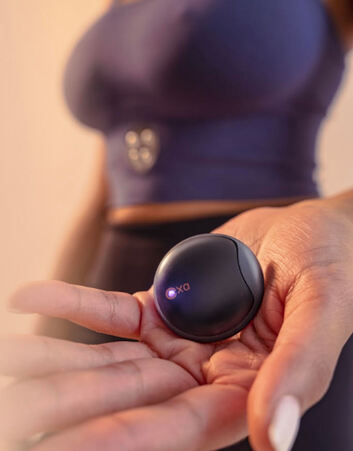
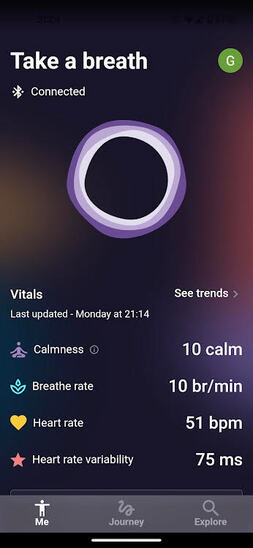

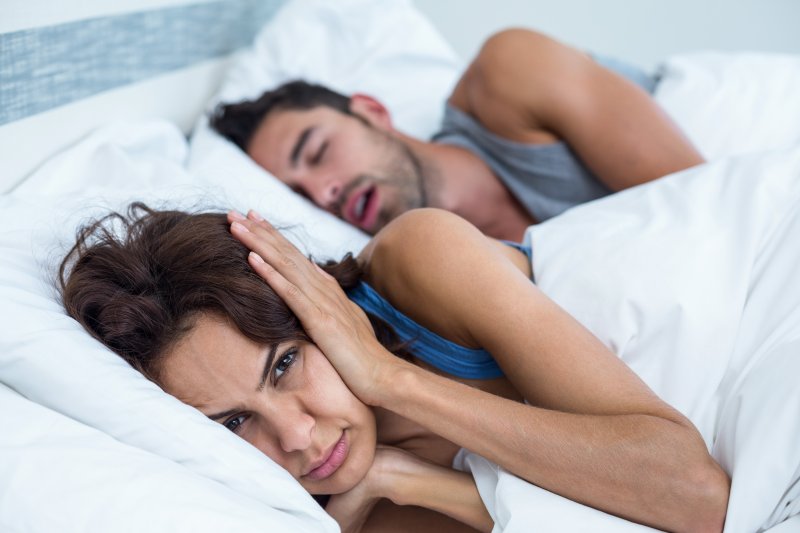

 RSS Feed
RSS Feed